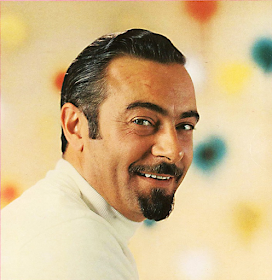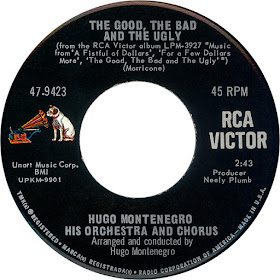Hugo Montenegro (September 2, 1925 - February 6, 1981) was
an American orchestra leader and composer of film soundtracks. His best known
work is derived from interpretations of the music from Spaghetti Westerns,
especially his cover version of the main theme from the 1966 film The Good, the
Bad and the Ugly. He composed the musical score for the 1969 Western Charro!
which starred Elvis Presley.
Hugo Mario Montenegro was born in New York City. He attended  Manhattan
College, studying composition. While in college. he began leading his own band
for school dances, which led into professional gigs on a full-time basis. This
was quickly interrupted, however, by a two-year stint in the U.S. Navy, most of
which he spent as the arranger for the Newport Naval Base band in Rhode Island.
Manhattan
College, studying composition. While in college. he began leading his own band
for school dances, which led into professional gigs on a full-time basis. This
was quickly interrupted, however, by a two-year stint in the U.S. Navy, most of
which he spent as the arranger for the Newport Naval Base band in Rhode Island.
 Manhattan
College, studying composition. While in college. he began leading his own band
for school dances, which led into professional gigs on a full-time basis. This
was quickly interrupted, however, by a two-year stint in the U.S. Navy, most of
which he spent as the arranger for the Newport Naval Base band in Rhode Island.
Manhattan
College, studying composition. While in college. he began leading his own band
for school dances, which led into professional gigs on a full-time basis. This
was quickly interrupted, however, by a two-year stint in the U.S. Navy, most of
which he spent as the arranger for the Newport Naval Base band in Rhode Island.
In the middle 1950s, he was directing, conducting, and
arranging the orchestra for Eliot Glen and Irving Spice on their Dragon and
Caprice labels. It was he who was directing the Glen-Spice Orchestra on Dion
DiMucci's first release when Dion was backed by Dragon recording artists, the
Timberlanes. Released on Mohawk #105 in 1957, the songs were "Out In
Colorado" and "The Chosen Few", which were soon issued on the
Jubliee label for better  distribution.
distribution.
 distribution.
distribution.
He was later hired by Time Records as a musical director
producing a series of albums for the label, and moved to Los Angeles in the
early 1960s where he began working for RCA records, producing a series of
albums and soundtracks for motion pictures and television themes, such as two
volumes of Music From The Man From U.N.C.L.E., an album of cover versions of
spy music themes Come Spy With Me and an album of cover versions of the Clint
Eastwood The Man With No Name series of spaghetti westerns that led to major
chart hits.
Montenegro began scoring motion pictures with the
instrumental music from Advance to the Rear in 1964. Following the success of
his albums, he was contracted by Columbia Pictures where he did such films as
Hurry Sundown (film) and two Matt Helm pictures.
Montenegro was also contracted to Coumbia's television production company Screen Gems where he is most famous for his theme from the second season of the television series I Dream of Jeannie, his theme song "Seattle" and music from Here Come the Brides and The Outcasts.
Montenegro was also contracted to Coumbia's television production company Screen Gems where he is most famous for his theme from the second season of the television series I Dream of Jeannie, his theme song "Seattle" and music from Here Come the Brides and The Outcasts.
Montenegro scored such classics of 60s Hollywood machismo as
Dean Martin's two Matt Helm adventures, The Ambushers and The Wrecking Crew,
Frank Sinatra's two films as the Miami private eye, Tony Rome and The Lady in
Cement, and the Elvis Presley Western, Charro. He also ventured into some odd
mixes of space-age pop, electronics, and rock with such albums as Moog Power,
Mammy Blue, and The Dawn of Dylan.
 Montenegro's electronic works were decisive and influential
for the future generations of electronic musicians, giving a retro/futuristic
edge by the use of the Moog synthesizer, and helped to push its popularity. He
will be also remembered by his versions of classics such as Ennio Morricone's
The Good, the Bad, and the Ugly.
Montenegro's electronic works were decisive and influential
for the future generations of electronic musicians, giving a retro/futuristic
edge by the use of the Moog synthesizer, and helped to push its popularity. He
will be also remembered by his versions of classics such as Ennio Morricone's
The Good, the Bad, and the Ugly.
Toward the end of his life, Hugo Montenegro fought with
 emphysema. RCA released a compilation of his work in 1980, The Best of Hugo
Montenegro, and his final LP Plays for Lovers came out in 1981. Montenegro lost
the fight with his lung condition and died on February 6, 1981 Palm Springs,
California.
emphysema. RCA released a compilation of his work in 1980, The Best of Hugo
Montenegro, and his final LP Plays for Lovers came out in 1981. Montenegro lost
the fight with his lung condition and died on February 6, 1981 Palm Springs,
California.
 emphysema. RCA released a compilation of his work in 1980, The Best of Hugo
Montenegro, and his final LP Plays for Lovers came out in 1981. Montenegro lost
the fight with his lung condition and died on February 6, 1981 Palm Springs,
California.
emphysema. RCA released a compilation of his work in 1980, The Best of Hugo
Montenegro, and his final LP Plays for Lovers came out in 1981. Montenegro lost
the fight with his lung condition and died on February 6, 1981 Palm Springs,
California.
His prolific compositions for film and his mark on the
future of sound recording have established him as an enduring figure in the
history of modern music. (info various mainly Wikipedia)



For Hugo Montenegro - The Good, The Bad And The Ugly (1968) go here:
ReplyDeletehttp://www6.zippyshare.com/v/8142818/file.html
01 - The Good, The Bad And The Ugly
02 - For A Few Dollars More
03 - The Ecstasy Of Gold
04 - Theme From A Fistful Of Dollars
05 - Aces High
06 - The Vice Of Killing
07 - Hang' Em High
08 - Tomorrow's Love
09 - Sixty Seconds To What?
10 - The Story Of A Soldier
11 - March With Hope
12 - Titoli (A Fistful Of Dollars)
Thanks to “So Musica” blog for link